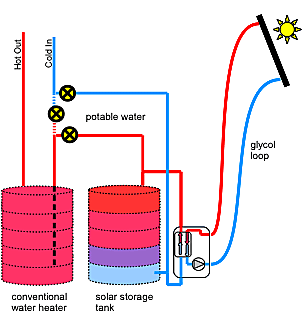
Solar Heating (glycol loop)
-
When the non-toxic glycol in the solar collector is hotter that the potable water in the bottom of the solar storage tank, the solar circulating pump turns on.
-
While the pump is running, heat from the collector is transferred into water within the solar storage tank.
-
Cooler water from the bottom of the tank is heated in a stainless steel heat exchanger, where it raises to the top of the solar storage tank.
-
This process continues until either the entire solar storage tank is fully heated, or until the collector is no longer warmer than the bottom of the solar storage tank.
Use of Water (potable loop)
-
When hot water is used from a faucet within the house, it is drawn out of the homes conventional water heater.
-
Pre-heated water from the solar storage tank replaces water in the conventional water heater.
-
Often the replacement water is hotter than the set-point on the conventional water heater's thermostat, eliminating the need for the conventional water heater to consume energy.
-
In cases where the solar pre-heated water is cooler than the conventional water heater setpoint, the conventional water heater will add the required energy to bring that water up to temperature.
-
In all cases, the hottest solar heated water is at the top of the solar storage tank, and that is the 1st water to be transferred into the conventional water heater.
-
This system ensures the coldest water is always the water being heated by solar.
Stagnation protection
-
Once the solar storage thank has been fully heated, the solar circulation pump is turned off.
-
If it is still sunny outside, the solar collector will continue to heat up.
-
The special collectors installed by Rock Paper Sun include an automated heat dissipation system built into the collectors.
-
This system operates off of heat activated springs, and does not require any circulating pumps or electricity to operate.
-
Because of this, Rock Paper Sun installed residential systems will not experience glycol over-heating or glycol dumping, even if the electric power should fail during a sunny period.


